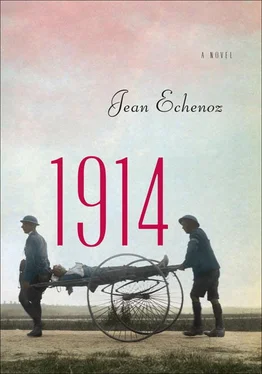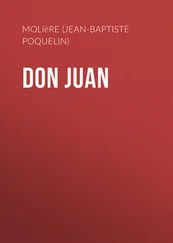It wasn’t just serviceable and edible animals that the men ran into now and then, however. They met up with more familiar ones as well, domestic and even decorative animals that were even more used to their creature comforts: cats and dogs left ownerless after the civilian exodus, without collars or the tiniest daily guaranteed saucer of food, gradually forgetting even the names they’d been given. There were caged birds as well, household pets such as turtledoves, even lawn ornaments like peacocks, for example, which no one ordinarily eats and anyway, given their lousy dispositions and hopeless narcissism, they had no chance whatsoever of pulling through on their own. In general, the military did not spontaneously come up with the idea of dining off that last category of animals, at least in the beginning. It might so happen, though, that soldiers would decide to keep one for company, sometimes for only a few days, and adopt a cat they found wandering in a communication trench as a company mascot.
On the other hand, cavorting around or burrowed in outside the fixed, static, bogged-down ground plan of the trenches, there were wild animals too, and that was an entirely different business. Before the fields and forests had been razed and smashed to pieces by artillery fire—the fields turned to Martian deserts, the woods reduced to ragged stumps—they had harbored, at least for a little while longer, freelance animals never enslaved by men either in peacetime or in war, at liberty to live as they pleased, unfettered by any code of labor. Among these creatures a decent crop of edible bodies was still available: hares, deer, or wild boar—promptly shot even though hunting was strictly forbidden during wartime, polished off à la bayonet, chopped up with an ax or trench knife—that sometimes provided soldiers with a windfall of alimentary extras.
The same thing happened to birds or frogs, tracked and harvested during the soldiers’ off-hours, and to every kind of trout, carp, tench, and pike they fished for with grenades whenever encamped beside running water, and to bees if by some miracle they found a hive not yet completely deserted. Last on the list came the marginal creatures, declared inedible by some vague interdict or other, such as foxes, crows, weasels, moles: as for them, although they were for obscure reasons pronounced unfit for consumption, it seems the troops became less and less finicky in this regard and that every once in a while they managed, by means of a ragout, to make an exception for hedgehogs. Like the other animals, however, these would soon become scarce on the ground after the invention and swift application of poison gases throughout the theater of operations.
But there’s more to life than eating. Because in the case of armed conflict, the animal kingdom provides some members that can be too useful as potential warriors to be eaten and these are recruited by force for their aptitude for service, such as militarized horses, dogs, or pigeons: some beasts are ridden by noncoms or set to pulling wagons, others are trained to attack, or haul machine guns, while in the bird department, squadrons of globe-trotting pigeons are promoted to the rank of courier.
Last of all and alas, above all, came innumerable creatures of the tiniest size and most redoubtable nature: all sorts of die-hard parasites that, not content with offering no nutritional value whatsoever, on the contrary themselves feed voraciously on the troops. First in line, the insects: fleas, bedbugs, mosquitoes, gnats, and flies that settle in clouds on the eyes—those choice bits—of corpses. And let’s not forget that parasitic arachnid, the tick. Still, the men could have coped with them all, but there was one adversary that quickly became a perpetual and utter scourge: the louse. A prolific champion, this insect in its fraternity of millions soon completely covered everybody. The other main enemy was the rat, no less gluttonous and just as omnipresent as the louse, equally expert at reproduction, but a specialist in fattening up, hell-bent on devouring the soldiers’ provisions—including those hung preventively from a nail—or nibbling on leather straps, attacking even your shoes and your very body when you’re asleep, and fighting with the flies for your eyeballs when you’re dead.
Even if it were simply on account of those two, the louse and the rat, obstinate, meticulous, organized, as single-minded as monosyllables, both of them focused exclusively on tormenting your flesh or sucking your blood, on exterminating you each in its own style— and let’s not forget the enemy across the way, devoted through other means to the same end—you often just wanted to get the fuck on out of camp.
Well, you don’t get out of this war like that. It’s simple: you’re trapped. The enemy is in front of you, the rats and lice are with you, and behind you are the gendarmes. Since the only solution is to become an invalid, you’re reduced to waiting for that “good wound”, the one you wind up longing for, your guaranteed ticket home (vide Anthime), but there’s a problem: it doesn’t depend on you. So that wonder-working wound, some men tried to acquire it on their own without attracting too much attention, by shooting themselves in the hand, for example, but they usually failed and were confronted with their misdeed, tried, and shot for treason. Mowed down by your own side rather than asphyxiated, burned to a crisp, or shredded by gas, flamethrowers, or shells—that could be a choice. But there was also blowing your own head off, with a toe on the trigger and the rifle barrel in your mouth, a way of getting out like any other—that could be a choice too.
IT SEEMS ARCENEL FOUND a third solution, without truly choosing it, actually; there was no premeditation, just an impulse, a mood, producing in turn a moment of pique and then—motion. It all began at the end of December, with Bossis dead and Anthime evacuated, when Arcenel could not find Padioleau either. He looked for him, inquired about him as best he could, even tried to question imperious, contemptuous, tight-lipped officers, all in vain. Arcenel faced the inevitable. Maybe Padioleau had died on the same day as Bossis, buried anonymously in mud without anyone caring or noticing in the confusion. Perhaps he’d been wounded like Anthime, sent home like him without anyone taking the trouble to inform his comrades—or just maybe, who knows why, he’d been reassigned to another company.
Be that as it may, there was no trace of Padioleau. Thus deprived of his three pals, Arcenel began to feel fed up. The war was no joke, of course, but it had been just about livable with the four of them when they’d at least been able to get together and talk among themselves, trade points of view, argue so they could make peace again. They’d never wanted to imagine their reassuring bond could possibly be severed, in spite of the increasingly obvious danger everywhere. The thought had vaguely occurred to them, true, but they hadn’t really prepared themselves to see their group broken up, dispersed, and had taken no social precautions, never attempted to make other friends.
So Arcenel found himself alone. He did try, during the weeks and months that followed, to fit in better with the troop, but it was always a little artificial and he encountered resistance because he and his three buddies had been seen as standoffish, so the others now took revenge by ignoring him, although given the harsh conditions that winter, a certain solidarity had in the end kept everyone together as a company. When spring arrived, however, dragging its feet and with no letup in the fighting, the usual groups re-formed without Arcenel finding a place in any of them. That’s why one morning, since they were camped near the village of Somme-Suippe for a breather before rejoining the front lines, Arcenel, feeling blue, went off for a walk.
Читать дальше









